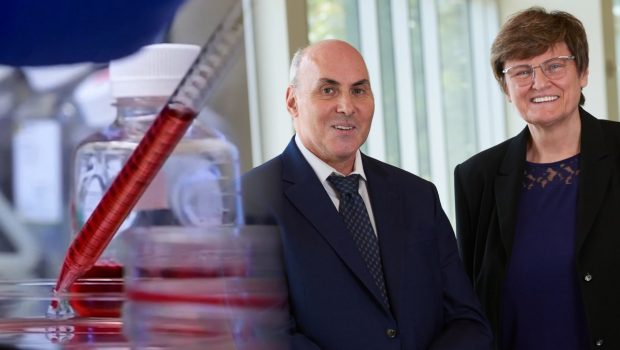What Is mRNA and Who Invented the Technology? – NBC New York
Recognized for the expeditious development of a lifesaving shot, scientists Dr. Katalin Karikó and Dr. Drew Weissman accepted an award in front of dozens of their peers celebrating the duo's tireless efforts in inventing the mRNA technology behind the COVID-19 vaccine.
On Tuesday in Manhattan, in conjunction with the Feinstein Institutes for Medical Research and Molecular Medicine, the Ross Prize honored the two biomedical researchers who changed the game during the COVID pandemic.
Dr. Weissman, a physician and researcher at Penn Medicine, directs a variety of projects including a pan-coronavirus vaccine to prevent the next COVID epidemic.
Dr. Karikó is a Hungarian-American biochemist and researcher at Penn Medicine and a senior vice president at BioNTech, a German biotechnology company that collaborated with American pharmaceutical giant Pfizer in creating the Pfizer-BioNTech COVID vaccine.
"As you hear in my presentation, it's not just me and Drew, but we agree that hundreds of scientists contributed to the result that we have the vaccine. Yes, we were not giving up, but many scientists are like us," Dr. Karikó said in her acceptance speech.
For decades, Dr. Karikó has been analyzing messenger RNA, or mRNA, which is essential in various biological roles, including the regulation and expression of genes.
Karikó and Weissman first met in 1998 over a photocopier while the two were reviewing science journals at the University of Pennsylvania. At the time, they both were experimenting with ways to generate vaccines.
With similar interests in mind, the two soon began collaborating on ideas that eventually, years down the line, laid down the foundation for swift development of the current Pfizer-BioNTech and Moderna COVID-19 vaccines.
Science Community Influence
The Pfizer-BioNTech COVID vaccine was first authorized for emergency use by the U.S. Food and Drug Administration (FDA) in December 2020 with Moderna's shot following suit.
Since the rollout started, 590 million doses of the COVID vaccine have been given in the U.S. and close to 12 billion doses globally, according to Our World in Data. Children under the age of 5 years old may soon be able to get the first dose as early as June 21, as soon as the FDA gives full authorization.
Facing various challenges leading up to this revolutionary shot, Dr. Weissman recalls waiting nearly 10 years to finally receive funding from the National Institutes of Health (NIH) after rejection and skepticism on mRNA technology from prominent leaders — like Dr. Anthony Fauci — asking, "Why are you wasting your time? Why don't you do something with potential impact?"
Credit: University of Pennsylvania
Before the award ceremony kicked off, NBC New York spoke with both world-renowned scientists on what's next for the science community and the future of medical technology. Dr. Karikó hopes this honor will bring in additional funding.
"Right now is, of course, more money being put into the RNA field and messenger RNA field and not just academic institutions but, of course, large companies also they are investing more. The messenger RNA is more so, somewhat an equalizer, mRNA is cheap to make, very quick," Dr. Karikó told News 4.
She aims to revisit previous ventures in treating diseases with mRNA therapeutics.
Dr. Weissman said the mRNA trend is unstoppable and has taken over biotechnology, pharmaceuticals and academic laboratories worldwide that, as he described, previously had no interest in the matter.
"My lab is making vaccines for HIV, for herpes, for malaria, for hepatitis C, for many other diseases. We're making vaccines for food allergies, peanut allergies. We're making vaccines for autoimmune diseases, so there's just no limit to what can be done with RNA," said Dr. Weissman, who strongly believes in promoting equity in the sciences around the world.








Gloss